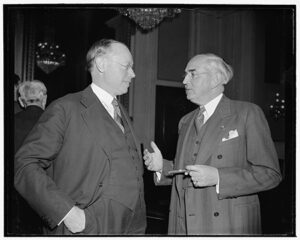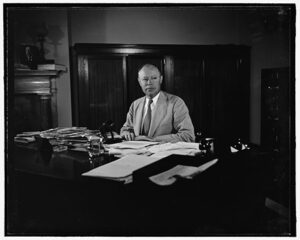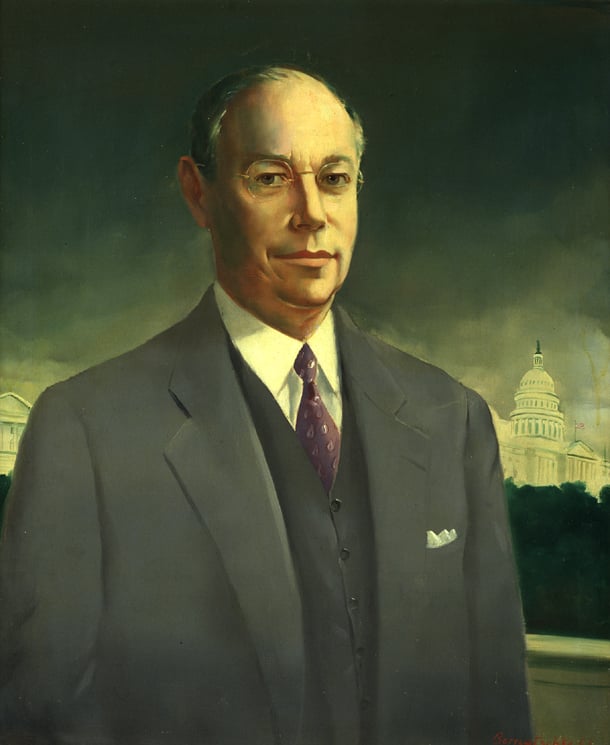He was known as “Mr. Republican” because of his insistence on party unity, the lack of which had cost his father a second presidential term in 1912, and “Mr. Integrity,” because of his strong moral foundation, laid down many years before by his grandfather, who insisted on uprightness in everything. That was part of being a Taft.
Robert A. Taft was “a man who stuck fast to the basic principles in which he believed,” wrote Senator John F. Kennedy in 1955, “and when those fundamental principles were at issue, not even the lure of the White House, or the possibilities of injuring his candidacy, could deter him from speaking out.”
Even though he didn’t hold the official position of Majority Leader until 1953, his last year in office, he was, with little doubt, the leader of Senate Republicans throughout the 1940s and early 50s. In fact, he was often referred to as the most powerful member of Congress during the height of his tenure.
In just 14 years of service, Taft laid his mark on the United States Senate to such an extent that The New Republic once declared, “Congress now consists of the House, the Senate, and Bob Taft.” He was also named one of the five greatest senators in American history by a committee led by Kennedy, who featured Taft in his Pulitzer Prize-winning book, Profiles in Courage.
Born in 1889, Robert Alphonso Taft was the eldest son of the 27th president of the United States and the 10th chief justice of the U.S. Supreme Court, William Howard Taft. He was named for his paternal grandfather, Alphonso Taft, who founded the great Taft dynasty in Ohio. Alphonso held four major posts under Republican presidents—secretary of war and attorney general under Ulysses S. Grant, and U.S. ambassador to Austria-Hungary and to Russia in the administration of Chester A. Arthur.
Young Robert Taft took after his Taft elders, showing early signs of high intelligence, which greatly helped him in his education. He was valedictorian at Yale and ranked first in his class at Harvard Law School, where he edited the Harvard Law Review in his final year.
Because of his bad eyesight, Taft was rejected by the army from serving in World War I. Instead, he worked in government with Herbert Hoover’s Food Administration, getting his first experiences with federal bureaucracy—lessons he would never forget.
After serving in both houses of the Ohio legislature, including a year as speaker of the house, Taft won election to the U.S. Senate in 1938 as a vocal opponent of the New Deal. Even though he was the son of a former president and the recipient of an Ivy League education, Taft campaigned as a common man, because that’s how he saw himself. “I am a humble man. I have simple tastes. I am not one of those highly educated men. I am just an ordinary man—like you,” Taft said on the campaign trail in 1938.
After surviving a tough primary slate, he won against the Democratic incumbent in November, even though Roosevelt’s program had a lot of recipients in Ohio. Always a man of the people, Taft clarified his allegiance, writing in a letter to Senator Ralph Flanders in 1947:
I feel very strongly that I am interested in people and that the principle which I support will do more good for the people than most of the New Deal ideas of regulation and planned economy. Probably I don’t express often enough what my real interest is, because it certainly is not in wealthier people or big business or any of those who seem to get some special advantage out of our present system.
Once elected, Taft did not shift positions; he became the most outspoken critic of FDR in Congress. He arrived in the U.S. Senate in January 1939, after the New Deal’s enactment, but that didn’t stop him from speaking out against it so forcefully that one scholar termed it “militant opposition.” As he always had, especially during his days in the Ohio legislature, Taft opposed wasteful and frivolous expenditures, which is what he considered the New Deal to be. “I believe the greatest threat to liberty is the tremendous growth of government spending,” Taft had said during his 1938 Senate campaign.

Freshman
Republican Senator Robert A. Taft (left) speaks with Senator Arthur Vandenberg (R-Mich.) on Jan. 17, 1939. (Harris & Ewing / Library of Congress)
In the Senate, Taft sought a cut in government appropriations, to no avail. “In my opinion,” he said, “the time has come when we should determine how heavy a tax burden is reasonably safe, and then cut our expenditures down to the probable receipts.” At that time, though, his opposition to tax-and-spend policies that had no regard for the burdens placed on the people made him seem like a lone wolf crying in the wilderness.
But that didn’t stop him from going after those who wholeheartedly backed the New Deal. Lamenting the power accumulated by FDR and his repeated violations of the Constitution, he remarked:
The whole trouble with the New Dealers is that they believe that whatever they desire the Court should hold to be constitutional. They do not care what happens to the fundamental principles on which this nation was founded. Most of them would be willing to abolish the States and turn over all local government to Federal control. All of them favor the delegation of legislative power to the President and seem to forget that this was the first step in the growth of autocracy in Germany and Italy.
Taft’s critics were numerous, lambasting him for old-fashioned thinking and branding him an “obstructionist” and a “reactionary.” One member of FDR’s brain trust said that Taft had the “best nineteenth century mind in the twentieth century.” The media was equally harsh. One wrote, “Taft has reached more wrong decisions more ably than any other man in public life.” Another said, “Sure Taft has progressed, but the progress is only from James A. Garfield to William McKinley.”
Taft likely felt at home with domestic policy and seeking to roll back the New Deal, but in 1939, his first year in the Senate, war clouds were gathering, and the major issue was the possible involvement of the United States in the second European conflict within a generation; so it was foreign affairs that ended up dominating Taft’s political life. As he said in a 1951 speech to the U.S. Chamber of Commerce, “People have accused me of moving into foreign policy. The fact is that foreign policy moved in on me.”
Roosevelt was pushing hard for war; Taft advocated restraint. In September 1940, Congress enacted the Selective Training and Service Act, the first peacetime draft in American history, which required all men ages 21 to 36 to register for military service. Taft was one of 10 Republican senators to vote against the bill. “I opposed that on the ground that I thought all the troops needed could be obtained by the volunteer system. I still feel entirely confident of that position,” Taft wrote in 1942. “I always stated my willingness to go to conscription when it became necessary, but at the time it was passed it was really only for the purpose of making the country class conscious, and to bring about our quicker entrance into the war.”
The following spring, FDR went a step further with his war agenda by way of the Lend-Lease Act, which passed in March and would allow the United States to “lend” military equipment to the Allied Powers. Roosevelt likened the plan to lending a garden hose to a neighbor whose house was on fire. After the fire is out, the president said, “I want my garden hose back,” not the 15 dollars the hose had cost. To this analogy, Taft countered, “Lending war equipment is a good deal like lending chewing gum. You don’t want it back.”
His noninterventionist leanings notwithstanding, after Pearl Harbor, Senator Taft did vote to declare war, and he supported the military effort, despite his suspicions.
After the war, in the midterm elections of 1946, Republicans took control of both houses of Congress for the first time since 1932. It was during the 80th Congress that Taft enacted his most famous legislative achievement, the Taft-Hartley Act of 1947, known today as a “right-to-work” law, weakening the power of labor unions.

Robert A. Taft at his Senate office desk (Harris & Ewing / Library of Congress)
But without a doubt, Taft’s most courageous stand came in the fall of 1946, when he spoke out against the Nuremberg Trials. Nazi leaders found guilty of crimes against humanity had been sentenced to hang in mid-October. In a speech at Kenyon College, in Ohio, Taft remarked:
I believe that most Americans view with discomfort the war trials which have just been concluded in Germany and are proceeding in Japan. They violate that fundamental principle of American law that a man cannot be tried under an ex post facto statute. The hanging of the eleven men convicted at Nuremberg will be a blot on the American record which we shall long regret.… In these trials we have accepted the Russian idea of the purpose of trials, government policy and not justice, having little relation to Anglo-Saxon heritage. By clothing vengeance in the forms of legal procedure, we may discredit the whole idea of justice in Europe for years to come.
These strong, courageous statements were made just weeks before the midterm elections and roughly a year before he would be gearing up for a second presidential run in 1948. Most ambitious politicians would not have dared to speak such an unpopular viewpoint, especially so close on the heels of the war.
The last years of Taft’s career were marked by his opposition to the internationalism that emerged in the wake of World War II. He voted in favor of the UN charter but against the United Nations Participation Act of 1945, seeking to keep America out of the new international body.
To confront the looming Soviet menace, in 1949 the United States helped form NATO, the North Atlantic Treaty Organization, a defensive military alliance that originally totaled 12 member-nations, including Britain and France. As with his opposition to joining the UN, Taft led the Senate resistance to NATO as well. “To my mind, the foreign policy of the United States should be directed, first, towards the maintenance of the liberty of our people against foreign attack, and second, towards the maintenance of peace so far as is consistent with the preservation of our liberty,” he said in a 1949 speech.
Channeling the same arguments used to defeat the old League of Nations under Woodrow Wilson, Taft expressed grave concern over the obligations placed on the United States, especially its military forces. “Under the new Pact the president can take us into war without Congress,” Taft said in a 1949 speech opposing the alliance. “It obligates us to go to war if at any time during the next 20 years anyone makes an armed attack on any of the 12 nations.” Although he was unable to keep the United States out of foreign entanglements, Taft continued to warn the country about the dangers of Washington’s growing war powers.
Taft ran unsuccessfully for the Republican presidential nomination three times: in 1940, when he lost out to Wendell Willkie; in 1948, falling short to Thomas Dewey; and in 1952, when he made his best showing, against Dwight Eisenhower. Taft actually emerged from the primaries that year with more votes, 2.8 million, and more delegates heading into the convention, where Ike’s forces eventually prevailed.
Taft laid the blame at the feet of the eastern establishment, “the power of the New York financial interest and a large number of businessmen subject to New York influence” that opposed him, he wrote in a confidential memo, as well as “four-fifths of the influential newspapers in the country” that “turned themselves into propaganda sheets for my opponent.”

His 1952 candidacy turned out to be the last hurrah for the Old Right. As Murray Rothbard wrote in The Betrayal of the American Right,
The great watershed, the single event that most marked the passing of the old isolationist Right, was the defeat of Senator Taft by Eisenhower in the Wall Street capture of the 1952 presidential nomination. With the Democrats vulnerable, 1952 was at last a chance for the Old Right to achieve dominance on the national scene. But the defeat of Taft … ended the Old Right as a significant faction of the Republican Party.
Had Taft won in 1952, he would not have been president long, as cancer took his life on July 31, 1953. In the end, Robert A. Taft left an indelible mark on conservatism and on the country. He was one of the great statesmen of our age.
Above: portrait of Robert A. Taft taken during the 83rd U.S. Congress, in January 1953 (U.S. Senate archives)
Top image: Oil painting of Robert A. Taft by Rudolf Anton Bernatschke, 1953 (U.S. Senate / public domain)

Leave a Reply